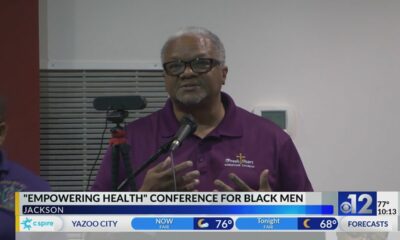Mississippi Today
Veiled accusations fly in hearing over disappearance and death of Jackson man
Following a contentious hearing Tuesday in the disappearance and death of a Jackson man, a Hinds County judge said he intends to keep an injunction in place until the state can complete an autopsy.
Chancery Court Judge Dewayne Thomas heard arguments Tuesday morning in a lawsuit to determine who will decide what happens to the remains of Belhaven Heights resident Dau Mabil and whether an independent autopsy can happen.
Mabil, 33, disappeared March 25, and three weeks later, his body was found over 50 miles away in the Pearl River in Lawrence County.
The day that a preliminary autopsy determined that the body was that of Mabil, his brother, Bul, filed the lawsuit against Mabil's wife, Karissa Bowley, and state investigators: the Capitol Police and the State Crime Lab. None of the defendants said they were notified of the April 18 hearing when Thomas entered the emergency temporary restraining order and preliminary injunction.

Bul Mabil and his attorneys have raised suspicions about what led to Dau Mabil's death, and they argue that an independent autopsy is the only way to be certain there was no foul play – contrary to what the Lawrence County sheriff has said. U.S. Rep. Bennie Thompson has requested the Justice Department investigate.
On Tuesday, that led to pointed questions by Bul Mabil's attorney Lisa Ross to Bowley, who testified for nearly two hours.
Ross' questions included implications about whether Bowley or some of her family members had something to do with Mabil's disappearance, including introduction of text message evidence showing that the couple had fought and spent a few days apart in the weeks leading up to him going missing.
The questioning culminated when Paloma Wu, who is representing Bowley, asked if she killed Mabil or knew who did, and Bowley said no.

Ross also asked Bowley other reasons why her husband went missing, including past arguments they had, money, whether Mabil was suicidal and why she didn't accompany him on March 25.
Throughout testimony, Wu made multiple objections to Ross' questioning, asking about how they were relevant, saying they were hearsay and they should be stricken from the record. Judge Thomas allowed most of the questions.
“This has become a performance for free-wheeling defamation,” Wu said about the attorney's questioning. “This is not a murder trial against Karissa.”
To date, there has been no evidence of foul play and nobody has been criminally charged.
Bowley said she would have agreed to an independent autopsy if Bul Mabil had just asked, and she would have preferred the family to have a conversation rather than having to go to court.
Multiple times, Ross asked Bowley if she would agree to make the results of the state's autopsy public and to allow an independent autopsy on Mabil's body.
“I have no reason not to,” Bowley replied.
In court filings, Bul Mabil argued he should be considered the next of kin who can make decisions about his brother's body rather than his brother's wife. Wu said the state law is clear that a surviving spouse takes precedence as next of kin over siblings and other descendants.
After the hearing, Ross said her questions highlight how there is no Mississippi case law that defines who counts as a surviving spouse. In other states, she found that courts have ruled that an estranged or separated spouse does not count as next of kin.
A motion by Capitol Police and the State Crime Lab filed late last week asks the judge to dismiss the temporary restraining order and lawsuit complaint.
Thomas said he plans to issue an order Thursday to address pending motions and issues raised in the hearing, and he said he will release a separate order addressing Bowley's request to be added as a plaintiff.
This article first appeared on Mississippi Today and is republished here under a Creative Commons license.
Mississippi Today
On this day in 1961
MAY 20, 1961

A white mob of more than 300, including Klansmen, attacked Freedom Riders at the Greyhound Bus Station in Montgomery, Alabama. Future Congressman John Lewis was among them.
“An angry mob came out of nowhere, hundreds of people, with bricks and balls, chains,” Lewis recalled.
After beating on the riders, the mob turned on reporters and then Justice Department official John Seigenthaler, who was beaten unconscious and left in the street after helping two riders.
“Then they turned on my colleagues and started beating us and beat us so severely, we were left bloodied and unconscious in the streets of Montgomery,” Lewis recalled.
As the mob headed his way, Freedom Rider James Zwerg said he asked for God to be with him, and “I felt absolutely surrounded by love. I knew that whether I lived or died, I was going to be OK.”
The mob beat him so badly that his suit was soaked in blood.
“There was nothing particularly heroic in what I did,” he said. “If you want to talk about heroism, consider the Black man who probably saved my life. This man in coveralls, just off of work, happened to walk by as my beating was going on and said ‘Stop beating that kid. If you want to beat someone, beat me.' And they did. He was still unconscious when I left the hospital.”
To quell the violence, Attorney General Robert Kennedy sent in 450 federal marshals.
This article first appeared on Mississippi Today and is republished here under a Creative Commons license.
Mississippi Today
Podcast: The controversial day that Robert Kennedy came to the University of Mississippi
Retired U.S. Bankruptcy Judge Edward Ellington talks with Mississippi Today's Bobby Harrison and Geoff Pender about former U.S. Attorney General Robert Kennedy's speech at the University of Mississippi less than four years after the riots that occurred after the integration of the school. Ellington, who at the time headed the Ole Miss Speaker's Bureau as a law school student, recalls the controversy leading up to the speech.
This article first appeared on Mississippi Today and is republished here under a Creative Commons license.
Mississippi Today
2024 Mississippi legislative session not good for private school voucher supporters
Despite a recent Mississippi Supreme Court ruling allowing $10 million in public money to be spent on private schools, 2024 has not been a good year for those supporting school vouchers.
School-choice supporters were hopeful during the 2024 legislative session, with new House Speaker Jason White at times indicating support for vouchers.
But the Legislature, which recently completed its session, did not pass any new voucher bills. In fact, it placed tighter restrictions on some of the limited laws the state has in place allowing public money to be spent on private schools.
Notably, the Legislature passed a bill that provides significantly more oversight of a program that provides a limited number of scholarships or vouchers for special-needs children to attend private schools.
Going forward, thanks to the new law, to receive the vouchers a parent must certify that their child will be attending a private school that offers the special needs educational services that will help the child. And the school must report information on the academic progress of the child receiving the funds.
Also, efforts to expand another state program that provides tax credits for the benefit of private schools was defeated. Legislation that would have expanded the tax credits offered by the Children's Promise Act from $8 million a year to $24 million to benefit private schools was defeated. Private schools are supposed to educate low income students and students with special needs to receive the benefit of the tax credits. The legislation expanding the Children's Promise Act was defeated after it was reported that no state agency knew how many students who fit into the categories of poverty and other specific needs were being educated in the schools receiving funds through the tax credits.
Interestingly, the Legislature did not expand the Children's Promise Act but also did not place more oversight on the private schools receiving the tax credit funds.
The bright spot for those supporting vouchers was the early May state Supreme Court ruling. But, in reality, the Supreme Court ruling was not as good for supporters of vouchers as it might appear on the surface.
The Supreme Court did not say in the ruling whether school vouchers are constitutional. Instead, the state's highest court ruled that the group that brought the lawsuit – Parents for Public Schools – did not have standing to pursue the legal action.
The Supreme Court justices did not give any indication that they were ready to say they were going to ignore the Mississippi Constitution's plain language that prohibits public funds from being provided “to any school that at the time of receiving such appropriation is not conducted as a free school.”
In addition to finding Parents for Public Schools did not have standing to bring the lawsuit, the court said another key reason for its ruling was the fact that the funds the private schools were receiving were federal, not state funds. The public funds at the center of the lawsuit were federal COVID-19 relief dollars.
Right or wrong, The court appeared to make a distinction between federal money and state general funds. And in reality, the circumstances are unique in that seldom does the state receive federal money with so few strings attached that it can be awarded to private schools.
The majority opinion written by Northern District Supreme Justice Robert Chamberlin and joined by six justices states, “These specific federal funds were never earmarked by either the federal government or the state for educational purposes, have not been commingled with state education funds, are not for educational purposes and therefore cannot be said to have harmed PPS (Parents for Public Schools) by taking finite government educational funding away from public schools.”
And Southern District Supreme Court Justice Dawn Beam, who joined the majority opinion, wrote separately “ to reiterate that we are not ruling on state funds but American Rescue Plan Act (ARPA) funds … The ARPA funds were given to the state to be used in four possible ways, three of which were directly related to the COVID -19 health emergency and one of which was to make necessary investments in water, sewer or broadband infrastructure.”
Granted, many public school advocates lamented the decision, pointing out that federal funds are indeed public or taxpayer money and those federal funds could have been used to help struggling public schools.
Two justices – James Kitchens and Leslie King, both of the Central District, agreed with that argument.
But, importantly, a decidedly conservative-leaning Mississippi Supreme Court stopped far short – at least for the time being – of circumventing state constitutional language that plainly states that public funds are not to go to private schools.
And a decidedly conservative Mississippi Legislature chose not to expand voucher programs during the 2024 session.
This article first appeared on Mississippi Today and is republished here under a Creative Commons license.
-
Our Mississippi Home7 days ago
Beat the Heat with Mississippi’s Best Waterparks
-
SuperTalk FM4 days ago
State auditor cracking down on Mississippians receiving unemployment benefits
-
Mississippi News Video6 days ago
Jackson has a gang problem
-
Kaiser Health News7 days ago
Medicaid ‘Unwinding’ Decried as Biased Against Disabled People
-
Local News3 days ago
Family files lawsuit after teen’s suicide in Harrison County Jail
-
Mississippi Today5 days ago
On this day in 1950
-
228Sports6 days ago
George County Pours Runs In 6A South State Title Victory At PRC
-
Local News Video5 days ago
In the Kitchen with J's Restaurant







































